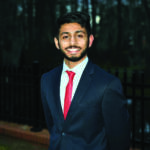STUDY ABROAD | PUBLIC HEALTH IN RURAL INDIA
TAKING THE HARD ROUTE
By Ayush Deshpande UL Lafayette ’21
My experiences in college have been led by two philosophies that I credit Phi Psi for teaching me — exploiting every possible opportunity available to me, and to always seek a challenge. These challenges have taken different forms in my college career, be it in academics with two majors and two minors, extracurriculars like being on the University Speech and Debate Team, or the kind of challenge that makes you question its worth, makes you bang your head against the wall, but ultimately provides you with greater satisfaction than all your other activities put together — like my Fraternity. One of our alumni (and the brother I hold responsible for recruiting me to the chapter) once told me that taking the harder route will leave you with the greatest possible sense of satisfaction; taking the easy way out is not the Phi Psi way. And so, I applied this principle to my professional life and began looking into internships in healthcare.
Leading into the summer of 2023, I knew I wanted to have an experience in the realm of public health. I also knew that I wanted to go abroad alone, being that I had never undertaken a task like that before. I decided to investigate going to India, though not my first time there. I am ethnically Indian and speak two Indian languages, and I was certain there were many experiences in public health to choose from by going to a nation that is still developing.
While searching online for organizations to work with, I stumbled upon Raah Foundation, a nonprofit based in Mumbai aimed at empowering tribal communities in Western India.
Working with the Raah Foundation was truly a riveting experience. I got to see their corporate office in a well-to-do part of Southern Mumbai, and just a few weeks after landing, got to visit Jawhar, a municipality where Raah first started its work.
Originally, the nonprofit focused its efforts on water retention and sustainable agriculture in the tribal Warli community in Jawhar but have since expanded to other projects like afforestation and job-skills training for the unemployed in Jawhar and other places nearby. They were extremely flexible when I asked if I could work on a public health project instead, stating that it was up to me how I wanted to help the community, and that I should not limit myself by worrying about the resources the project may require.
The most rewarding part of the experience was being able to deep dive into the realm of problem solving. I got to witness firsthand what a team of people dedicated toward solving social issues looked like, and I engaged in what can only be described as primary research. My main motive was to better understand what healthcare looked like in rural India, and to identify any problems that were plaguing the community. That would allow me to understand how Raah could use its manpower and resources to improve the health of people there.
The first thing I noticed was that the officers in Raah were adamant that the main service work be done by members of the community itself. This was imperative in to build a sense of community ownership in the work that Raah was doing for the populace. I also understood that it was one thing to formulate questions that you wanted to ask people, but another entirely when trying to extract information we wanted. The community we were working with were quite afraid that people who came asking questions about their quality of life wanted to take away their land or government subsidies.
One of the main barriers that I faced was my “city accent.” For anyone who speaks Marathi, the difference is quite stark; many of the villagers were able to tell immediately I was not from around there. The “city accent” is much more traditional, and the words used are occasionally borrowed from other languages, including English.
I also had a chance to interact with doctors at the local Public Health Centers (PHCs) who practiced both Western and Traditional Medicine.
The biggest lesson that I learned though was that community ownership must be organic when working for a social cause. Even though conducting discussion groups with the community to come up with seemingly obvious answers to complex questions may seem futile, it is by far, in my updated opinion, the most effective way to get people comfortable with talking about collective problems.
It only took asking the midwives and nurses at the local PHC about their opinion on the quality of aid they receive from the Central Government (equivalent to the Federal Government in the U.S.) for them to go on a rant about what kind of support they were truly lacking.
I learned that volunteering can only go so far as the volunteer is willing to go — but a discussion never ends just because people drop in and out of the conversation. What is most important is just the foundation of such a discussion in the first place; a process I am proud to say I was a part of.
It was an incredible experience, and I learned so much — but the best part is that I had the honor of writing this story for my brothers across the world. Amici!

